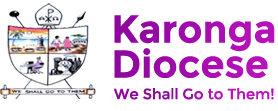According to the Canon Law (Can. 511), in each diocese, in so far as pastoral circumstances suggest, a pastoral council is to be established. The function, under the authority of the Bishop, is to study and weigh those matters, which concern the pastoral works in the diocese, and to propose practical conclusions concerning them. In the Diocese of Karonga, the Pastoral Council is known as the Pastoral Commission.
The Pastoral Commission oversees the pastoral care ministry, which is the core purpose of the existence of the diocese. It coordinates all the pastoral care ministries, programmes, activities, and policies of the Diocese of Karonga under the guidance of the local ordinary. The commission carries its mandate to fulfil the mission of Christ, which is to go out and evangelize to all nations (Mk 16:15-16).
Currently, the Pastoral Commission is composed of the following members:
- Mons. Fr. Lorent Dziko, Vicar General
- Rev. Fr. Robert Songa, Pastoral Coordinator & Secretary of the Commission
- Rev. Fr. Aubrey Bonaventure Sumbukeni (CICM) as Deputy Pastoral Coordinator
- Rev. Fr. Alick Sikwese
- Mr. John Island Mtambo, Chairperson of the Diocesan Laity Council
- Mr Mwawi Shaba, Caritas Secretary
- Mr. Innocent Nazombe, Tuntufye Radio Director
*There is also supposed to be representative of Religious Women and Youths.
The daily operations of the Pastoral Commission are coordinated by the Diocesan Pastoral Co-ordinator, who is also the Secretary of the Commission. His functions are to:
- Act as the link between the Diocese and the National Pastoral Commission of the Episcopal of Conference Malawi (ECM);
- Facilitate the implementation of National Pastoral Guidelines within the Diocese;
- Plan and organize diocesan pastoral events;
- Regularly update the Local Ordinary on the pastoral situation of the Diocese;
- Collaborate with other departmental heads, parish priests and other pastoral agents in order to achieve effective and efficient pastoral objectives;
- Collaborate with Pastoral Co-ordinators from other dioceses;
The Commission provides its services through the following departments and chaplaincies: Children’s Desk, Youth’s Desk, Women’s Desk, Catechetical Desk, Lay Apostolate, Bible Apostolate, Family Apostolate, PMS Directorate, Catholic Scouts, Liturgical Commission, and the Social Communications Desk.
To carry out its work, the Pastoral Commission relies on the already established structures of the Church; from the Diocese- Deanery – Parish- Pastoral Zone – Outstation – Substation – Small Christian Community – to Family. These structures act as entry points for pastoral ministries, as well as mode of channelling feedback to and from the people.
THE DIOCESAN COMMISSION FOR DIVINE WORSHIP – LITURGICAL COMMISSION
Liturgy is the centre and core of the life of the Church. It is one of the concrete moments where the faithful encounter the God they believe in and profess. To celebrate its liturgy worthily and help all members to actively participate in it, the Catholic celebrations have their own norms and rituals. These norms and rituals make the liturgy to be both a celebration and solemnity. The primary role Diocesan Commission for Divine Worship, therefore, is to ensure that the Liturgy is properly celebrated in line with the Catholic Church’s norms and rituals.
BIBLE APOSTOLATE DESK
The main objective of the Bible Apostolate Desk of the Diocese is to promote people’s knowledge of the Bible through Bible studies and Bible sharing. The Bible Apostolate encourages Catholics to seek God’s Will in their daily lives by reflecting on the Word of God every day. It seeks to assist the faithful to cultivate a personal encounter with Christ through praying with the Scriptures to live, share and witness the Gospel. To fulfill its vision, the Bible Apostolate organizes retreats, faith formation sessions based on the Word of God in all parishes and for all lay movements.
INTERRELIGIOUS DIALOGUE
The Department of Interreligious Dialogue, which is also known as Interfaith Dialogue strives to promote cooperative, constructive, and positive interaction between people of different religious traditions (i.e., “faiths”) and/or spiritual or humanistic beliefs, at both the individual and institutional levels within the Diocese of Karonga.
The area under the jurisdiction of the Diocese of Karonga has many faiths/denominations such as the Church of Central African Presbyterian (CCAP), Anglican, Lutheran and other Churches of Evangelical origins. There are also local African independent Churches like the Blackman’s Church and Ngemera. There is also Islam, though it is a minority religion. The department of Interreligious Dialogue works with other religions to promote mutual understanding and respect between different faiths within the jurisdiction of the Diocese of Karonga so that people live peaceful despite their religious differences.
Objectives of the Interreligious Dialogue Desk
- To Increase mutual understanding and good relations between Catholics and people of other faiths.
- To identify causes of tension between Catholics and people of other faiths.
- To build understanding and confidence to overcome or prevent tensions that are caused by religious beliefs of the people.
- To break down the barriers and stereotypes which lead to distrust, suspicion, and bigotry.
